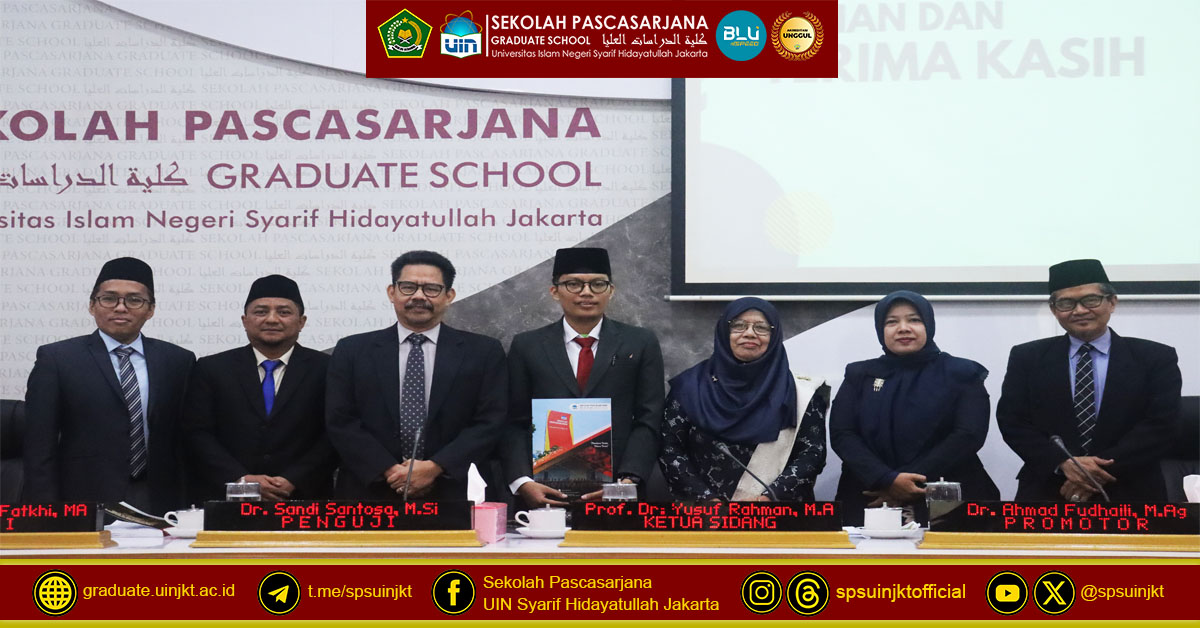Muhammad Miqdad Al Farizi's Thesis Test, Opening New Horizons for the Meaning of Women's Hadith in Khazanah Nusantara
Auditorium of Prof. Dr. Suwito, MA SPs UIN Jakarta, SPs NEWS – The Graduate School of Syarif Hidayatullah State Islamic University Jakarta held the 2786th Thesis Exam in the Auditorium Room of Prof. Dr. Suwito, MA SPs UIN Jakarta, on Friday, November 7, 2025 with candidate Muhammad Miqdad Al Farizi.
Miqdad is a student of the Master of Islamic Studies study program with a concentration in Hadith and Prophetic Tradition. Miqdad wrote a thesis entitled "Women's Discourse in the Book of Hadith Hidāyah al-Ḥabīb fī al-Targhīb wa al-Tarhīb Karya Nuruddin al-Raniri".
This research takes readers back to the 17th century, highlighting the monumental work of the prominent Nusantara scholar, Nuruddin al-Raniri. The book Hidāyah al-Ḥabīb fī al-Targhīb wa al-Tarhīb, which has been known as a compilation of the hadiths of targhib (motivation) and tarhib (warning), is now specifically discussed from the point of view of the women's discourse contained in it. This step is important to understand how scholars in the past constructed religious narratives, especially those related to the roles and positions of women.
Using a qualitative approach with data sources in the form of manuscript texts, she managed to search and find as many as thirty-three hadiths that explicitly discuss women, with keywords such as al-nisā', mar'ah, and imra'ah. This discovery became the initial foundation for a more in-depth analysis, positioning this study as a significant and groundbreaking study of the archipelago's hadith.
The method used is fairly comprehensive: descriptive-comparative-analytical. This thesis applies the takhrīj method to test the quality of the sanad and matan of the hadiths, answering the crucial issue of their authenticity. Further, the normative meaning of the hadith is enriched through sharḥ hadīs (explanations of the hadith), ensuring a complete understanding before entering the stage of contextual analysis.
The culmination of this research methodology lies in the use of Hans-Georg Gadamer's Hermeneutic Theory. This theory was strategically chosen to avoid rigid and textual interpretation of the hadith. Through the four main instruments of historical awareness, pre-understanding, fusion of horizon, and the application of this research aims to uncover the dynamics of contextual and historical meaning of hadith.
The main findings of this thesis are groundbreaking. Miqdad proposes a sufistic and hermeneutic reinterpretation of women's hadiths. As a result, the hadith about women, which is often understood in the framework of rigid normative law, is elevated to an ethical and spiritual guideline. This is emphasized as the key to building harmonious and equal household relationships in the modern era.
The central argument of this study is that the hadiths in Hidāyah al-Ḥabīb fī al-Targhīb wa al-Tarhīb wa al-Tarhīb are dynamic texts that can be interpreted more broadly. In this context, hadith as the second source of Islamic teachings must always be in harmony with the changes of time and the development of the times.
Interpretation through the hermeneutic horizon is an alternative that offers a more comprehensive understanding, far beyond mere textual boundaries.
This thesis concludes that the women's hadiths in Nuruddin al-Raniri's work do not need to be understood in the framework of rigidity. On the contrary, the hadith can be a very relevant source of spiritual ethics and relational education. The goal is to encourage reciprocity (mubādalah) and justice in today's household framework.
Miqdad's research clearly distinguishes itself from previous studies, such as those conducted by Alimron (2018), which only highlights the philological and historical aspects of the manuscript. This thesis chooses to focus on the content and thematic meaning of women's hadiths by offering a contextual and sufistic approach that is more applicable to daily life.
Miqdad's success in this thesis exam is a breath of fresh air for the study of hadith in the archipelago, proving that the intellectual heritage of previous scholars still holds great potential for progressive and relevant scientific dialogue to contemporary socio-religious challenges, especially the issue of equality and justice for women in the perspective of Islam.
Muhammad Miqdad AL Fraizi successfully defended his thesis under the guidance of Dr. Ahmad Fudhaili, M.Ag, and was tested in front of a board of examiners consisting of Prof. Dr. Yusuf Rahman, MA, Dr. Ahmad Fudhaili, M.Ag, Dr. Rifqi Muhammad Fatkhi, MA and Dr. Sandi Santosa, M.Si and managed to achieve the title of Very Satisfactory.
After paying attention to the thesis writing, the comments of the examiner team and the candidate's answers, the examiner team determined that Muhammad Miqdad AL Fraizi successfully graduated with the title of Very Satisfactory. Muhammad Miqdad AL Fraizi is the 2786th Doctor in the field of Islamic Studies, in the master's program of the Graduate School of UIN Syarif Hidayatullah Jakarta. (JA)

